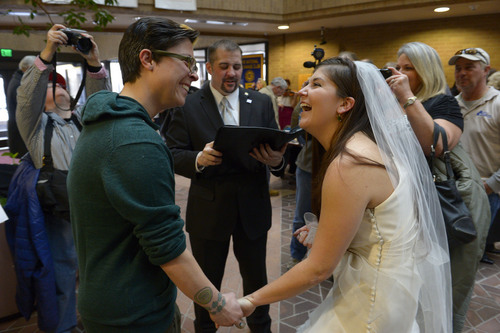This is an archived article that was published on sltrib.com in 2014, and information in the article may be outdated. It is provided only for personal research purposes and may not be reprinted.
Even Utahns who do not favor expanding the legal definition of marriage to include same-sex couples recognize that the day is coming when that is exactly what will happen.
This growing realization, if not total acceptance, of the judicial tidal wave of support for same-sex marriage is another reason why the lawyers representing the state of Utah in defense of its Amendment 3 should do everything they can to bring their obligatory defense of that law to a quick end.
One such step would be to give up the state's request for more time to reply to a related lawsuit, the one over the legal status of the many same-sex couples who were married in the 17-day window between the time Amendment 3 was struck down by U.S. District Judge Robert J. Shelby and the time that order was stayed by the U.S. Supreme Court.
Those couples married in good faith at a time when the only standing legal ruling was that their unions were legitimate. For the state to go to these lengths to deny them the benefits of marriage — from tax status to the ability to jointly adopt children — goes far beyond the duty to defend its laws and veers into the realm of vengeance and cruelty.
The American Civil Liberties Union is correct when it argues that any extension of the time these families live in legal uncertainty is wrong and should not be granted. All it is likely to do it delay the inevitable, causing pain to a few households and benefiting the rest of us not at all.
According to a new poll from Dan Jones and Associates, sponsored by Zions Bank and UtahPolicy.com, as many as 61 percent of Utah adults in the category of "likely voters" oppose same-sex marriage. But almost as many, 58 percent, say they expect the U.S. Supreme Court, when it finally rules on the matter, is likely to uphold earlier decisions that struck down Amendment 3, the 2004 voter-approved initiative that banned marriage equality in Utah.
There was apparently no follow-up question asking those surveyed whether the world would, upon that ruling, be destroyed by volcano, tsunami, asteroid or all of the above.
That is, of course, because it won't be. Same-sex marriage has been legal in other American jurisdictions, and in other nations, for as much as a decade. Any forecasts of resulting damage to other marriages, families or children have proven to be totally unfounded.
Of course, the path the Supreme Court might take in this matter is difficult to predict. But whatever it decides on Amendment 3, the clear generational shift in attitudes makes it clear that full legal acceptance, followed by full social acceptance, of same-sex marriage is in the cards.



